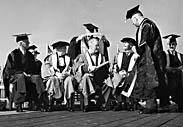In focus
Sinéad Collins: Belle of the bio world
If you know her as one half of the drag performance duo "Too Good to be Bio," or as a poet and producer of chapbooks, or if you see her name next to an article in the September issue of Nature, you could be forgiven for assuming that there are two writers going by the same name. But, nope, there's only one Sinéad Collins.

Claudio Calligaris
The Nature article, co-authored by her supervisor, Professor Graham Bell, describes her doctoral research on the long-term effects of changing CO2 on algae.
Her research shows that we can no longer assume, as Collins says, "that as we put more carbon into the atmosphere, small green things will take more carbon up, [just] because they do over the short term." The implication is that greenhouse effects may produce even more unnervingly unpredictable swings in the global climate than originally thought.
She has found that algae, once it finds itself living in the CO2-rich environment we are bound to have in the next 150 to 200 years, might just go on a sit-down strike. "I feel like a doom-and-gloom lady," she jokes.
When Collins's algae are immersed in high levels of CO2, "they just become really lazy. With normal levels of CO2, almost all green algae have to work really hard to get CO2 into their cells. If you give them lots of CO2, they just stop spending that energy: they'll either take up less, or take it up more slowly, or they take it up with less affinity, or it will leak right back out."
Collins has in a sense taken her algae on a number of time trips — both into the future, when CO2 levels will be much higher, and back into the past, when they were much lower.
Vials full of a bright green soupy mixture of the single-celled algae were grown in a phytotron — which sounds very Dr. Who, but Collins assures me that it is a little climate control chamber — so that they could be ever so gradually fed a pre-industrial environment.
Collins is quick to point out that her results come with a caveat. "What we wanted to do was tease out the role of CO2 on its own." The conditions were very controlled: there were no changes in temperature or light levels. The hope is that others will continue this line of experimentation with sea water algae. Still, "This is the first one of its kind, and I think it's a good start."
Bell, whose research got Collins started off on the algae track, is, as she puts it, "bemused" when she mentions her non-scholarly performances. Although she hasn't given any poetry readings in the past year, she continues to perform as one half of "Too Good to be Bio" at popular queer soirée Meow Mix and the annual lesbian cabaret, Boudoir. They will also be performing at McGill's upcoming Dyke Days.
Considering the range of her academic and creative production, not to mention her work volunteering with Gay Line and sitting on McGill's Queer Equity Sub Committee, can we assume she is a compulsive multi-tasker? Not at all. "I'm not a good multitasker. I'm one of those people who would accidentally put my computer in the oven and try to stir-fry my floppy disk."
Yet she recently finished her first novel, a retelling of the story of Heloise and Abelard. Her Pocket Poetry Project, a series of poetry pamphlets distributed randomly about town, has elicited emails from children, other writers and visitors from other cities.
"It's amazing how much you can do if you just do one thing at a time until it's done."
In the end, she points out that often "it takes less time to just do something than it would have taken to think about doing it."
There's a busy year ahead for Collins. The results of the second part of her research must be analyzed and written up by June, as she will be moving to Spain this summer to start her post-doctoral research.
Ironically, she jokes that she was probably the one voted least likely to finish her doctorate. "I feel like I'm already an absent-minded professor and I'm just waiting for the degree."
"I'm one of those people you see in the coffee shops on Saturday morning with their T-shirt on inside out. But I'll be proofreading my novel with my T-shirt on inside out!"
 |
||||
|
Last time I looked I had a sexy woman inside me, not a sexy girl. If you are frumpy, you're committing a sign crime. It's a semiotic crime. It's not just a fashion crime. |
||||
60th Anniversary of Special Convocation
On September 16, 1944, McGill Principal F. Cyril James presided over a special convocation celebrating two leaders of particular acumen in war, U.S. President Franklin Delano Roosevelt and British Prime Minister Winston Churchill.

British Prime Minister Winston Churchill (second from left) and U.S. President Franklin Delano Roosevelt (receiving his hood) were given McGill honorary degrees in the spring of 1944
An opportunity to honour Roosevelt plus Churchill arose in September 1944 in the lead up to the second conference of the main Allied leaders in Quebec City, the so-called Octagon Conference that took place from September 11-16, 1944.
The decisive final steps were taken by Montreal businessman J.W. McConnell, who called Mackenzie King on September 15 asking the Prime Minister to talk to the other two leaders.
Events over the next 24 hours moved very quickly. Upon hearing from the Prime Minister, McConnell called James at 16:10 that same afternoon to say that they could proceed with the ceremony at 15:00 the next day. With such a fast turnaround time James had to move rapidly. Calls were made to members of the university's Senate to obtain their approval, the degrees had to be prepared and James needed transportation to get to Quebec City. Logistics arranged, James set down at 19:00 on September 15 to start writing three short and very important speeches – one for the Governor General, and two for himself as introductions to the two wartime leaders. He finished them as his train pulled into the station at Quebec City.
Shortly before the ceremony began there was mix up in the gowns as Mackenzie King captured in his diary. "Unfortunately the robe given to Mr. Churchill was very short. Evidently intended for some short lady. It was I imagine meant for Princess Alice (the Governor General's wife). Churchill looked rather absurd in it. Princess Alice was suggesting to change with him but I said at once to take mine."
Churchill was the more loquacious of the two leaders in referencing McGill and the special location. "This is a high honour which I have received at your hands, and which I greatly value," Churchill began. "It is hard to think of any more striking a setting in which such dignities could be conferred. Wartime has justified you in making this new departure in creating these new degrees, but it is war-time that governs all our affairs at the present. I think this gathering here may well be a unique spectacle, and an episode by itself, in the long and honourable history of McGill University."
Despite the conviviality of the special convocation in September, Mackenzie King did not actually like James, and nor did some of his top advisors. The Prime Minister referred to James as "an ass of a fellow" to the Governor General on August 8, 1943.
These harsh sentiments derived in part from James' responsibilities as Chair of the Committee on Reconstruction. From this position James came into conflict with some of the Prime Minister's top wartime bureaucrats.
Such were Mackenzie King's views of James, in fact, that less than one month after the convocation Mackenzie King was actively trying to remove James from his position at McGill.
The tension did not last long. Mackenzie King focused on winning the war, and James and the Prime Minister became close friends after the end of hostilities.
 |
||||
|
It's nice to have tasty quasi-fresh vegetables and fruit during the winter without paying a lot for them. Isn't it weird to think that 50 years ago, maybe less, you couldn't even find a tomato in Canada during the winter — unless it was canned? |
||||
